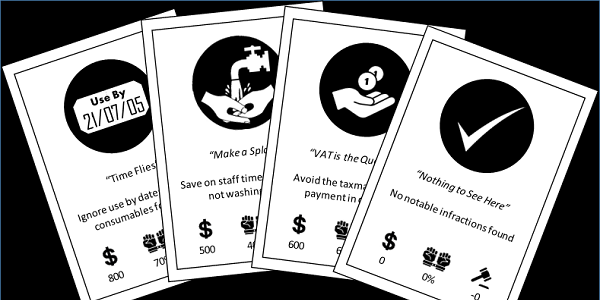
August 3, 2017, by Stuart Moran
The Role of Paper Prototyping in Digital Engagement
In order to demonstrate the effectiveness of both virtual reality and digital public engagement, the Digital Research Team are working with researchers School’s of Politics, Law and Computer Science to develop an interactive experience. The goal is to explore aspects of corruption and whistle blowing in the workplace through a virtual reality game. The game will not only serve as a novel means of engaging with complex and uncomfortable research topics, but also serve as a research instrument to control and vary different conditions.
The game will see two players take on different roles in the context of a restaurant – one being the owner, the other is a health inspector. The owner will be offered the opportunity to save money and or time by choosing to make various types of health infractions (or not). The inspector will then be tasked with finding and reporting the infractions made by the owner. However, the owner has the opportunity to offer the inspector a cash bribe to not report particular infractions. The final element of the game is a computer controlled auditor (the inspectors ‘boss’), who will verify the accuracy of the inspectors report with a set probability of success. If there is a discrepancy in assessment and report, then both owner and inspector will be fined. The winner of the game is the player with the most money at the end.
Q1: How is this a research tool?
There are many different variables that can be controlled in the experience, including the setting, the likelihood of being caught, the starting salary, the incentives to commit infractions etc… It is then possible to capture the thresholds at which players accept or rejecting bribes. With a large number of players, a variety of different scenarios can be explored and provide insight into some of the factors that affect willingness to accept or offer bribes.
Q2: How is this fun for the public?
In order to encourage people to take part, the game needs to be fun. This is primarily achieved through the negotiation component of the game – that is, the game itself is merely a context / setting, and it is the players own dialogue, role playing and interaction that will create the fun. The novelty of using virtual reality will also add to both the excitement and immersion, which should help reinforce both the fun role playing elements of the game.
Q3: Why use paper?
Implementing the game in virtual reality is a time consuming and difficult process. Making changes to the game once it has been created becomes challenging. As such, a typical approach to designing games (and digital technologies in general) is to make use of rapid paper prototyping. The team has created a ‘rough and ready’ board game version of the digital game using nothing more than pen and paper, and a simple template in Power Point. Having this abstract paper version allowed the team to quickly make changes to the mechanics and mathematics of the game by running through a number of iterations.
This has not only allowed us to effectively balance the game (so it is fair for both players), but for us to directly observe and participate in the negotiation element of the game. Through this we learnt a number of things around game logistics, monetary values, time limits and waiting periods. All of which will help inform the design and narrative of the digital game. Having validated the game principles on paper, it makes it possible to implement the game in many different digital formats (mobile game, desktop game, location based, virtual reality), and avoid any technical constraints.
The team will more than likely offer the paper version of the game as a free-download or gift to participants to take home with them following their experience with the virtual reality game. Paper prototyping is an essential mechanism for designing and understanding any digital technology, and is a solid reminder that digital is not always the first or even best solution.
Next steps for this work are to implement a prototype of the virtual reality game, while the team continue to balance and adjust the game using the paper prototype.
The overall goal is to launch the virtual reality game at the GameCity event held at Nottingham in late October. If you are interested in discussing or experiencing virtual reality, please feel free to get in touch with the Digital Research Team.
Next blog in series: The Corrupt Kitchen VR
Previous blog in series: Horizon scanning for digital engagement technologies in Politics and Law
Stuart Moran, Digital Research Specialist for Social Sciences
No comments yet, fill out a comment to be the first

Leave a Reply